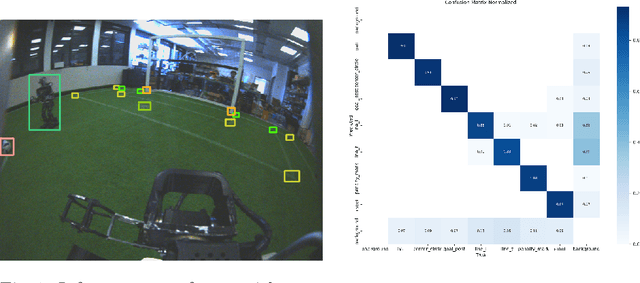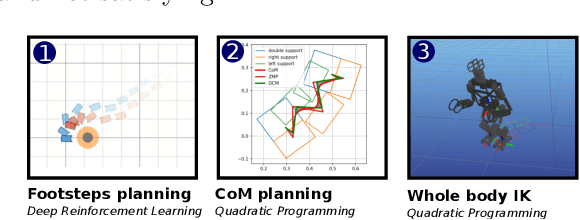Clément Gaspard
FRASA: An End-to-End Reinforcement Learning Agent for Fall Recovery and Stand Up of Humanoid Robots
Oct 11, 2024



Abstract:Humanoid robotics faces significant challenges in achieving stable locomotion and recovering from falls in dynamic environments. Traditional methods, such as Model Predictive Control (MPC) and Key Frame Based (KFB) routines, either require extensive fine-tuning or lack real-time adaptability. This paper introduces FRASA, a Deep Reinforcement Learning (DRL) agent that integrates fall recovery and stand up strategies into a unified framework. Leveraging the Cross-Q algorithm, FRASA significantly reduces training time and offers a versatile recovery strategy that adapts to unpredictable disturbances. Comparative tests on Sigmaban humanoid robots demonstrate FRASA superior performance against the KFB method deployed in the RoboCup 2023 by the Rhoban Team, world champion of the KidSize League.
FootstepNet: an Efficient Actor-Critic Method for Fast On-line Bipedal Footstep Planning and Forecasting
Mar 19, 2024



Abstract:Designing a humanoid locomotion controller is challenging and classically split up in sub-problems. Footstep planning is one of those, where the sequence of footsteps is defined. Even in simpler environments, finding a minimal sequence, or even a feasible sequence, yields a complex optimization problem. In the literature, this problem is usually addressed by search-based algorithms (e.g. variants of A*). However, such approaches are either computationally expensive or rely on hand-crafted tuning of several parameters. In this work, at first, we propose an efficient footstep planning method to navigate in local environments with obstacles, based on state-of-the art Deep Reinforcement Learning (DRL) techniques, with very low computational requirements for on-line inference. Our approach is heuristic-free and relies on a continuous set of actions to generate feasible footsteps. In contrast, other methods necessitate the selection of a relevant discrete set of actions. Second, we propose a forecasting method, allowing to quickly estimate the number of footsteps required to reach different candidates of local targets. This approach relies on inherent computations made by the actor-critic DRL architecture. We demonstrate the validity of our approach with simulation results, and by a deployment on a kid-size humanoid robot during the RoboCup 2023 competition.
Rhoban Football Club: RoboCup Humanoid Kid-Size 2023 Champion Team Paper
Feb 01, 2024



Abstract:In 2023, Rhoban Football Club reached the first place of the KidSize soccer competition for the fifth time, and received the best humanoid award. This paper presents and reviews important points in robots architecture and workflow, with hindsights from the competition.
 Add to Chrome
Add to Chrome Add to Firefox
Add to Firefox Add to Edge
Add to Edge